Link
Imagine the following scenario: A local car dealer says he is going to hold a drawing and randomly choose one person in town to receive a free automobile. It may be a publicity gimmick, but it’s a pretty good one; we’d rightly call this a smart promotion, and the dealer in question is likely to more than make up for the cost of the car in terms of goodwill, name recognition, and foot traffic coming through his lot.
Now imagine a second scenario: Another dealer in town says that he is simply going to give a free car to every single family in town, no strings attached and no questions asked. At this point, we’re no longer talking about a promotion; it’s sheer lunacy. Call it what you will, but it probably goes without saying that this dealer is going to lose money.
All of this to say: There’s a fine line between what’s promotion and what’s not—and on the Internet, the opposite of promotion often tends to be piracy.
1 note
·
View note
Link
“If an advert from an established brand appears on an infringing website not only does it lend the site a look of legitimacy, but inadvertently the brand and advertiser are funding online crime,” said Detective Chief Inspector Andy Fyfe from the City of London Police Intellectual Property Crime Unit
0 notes
Photo
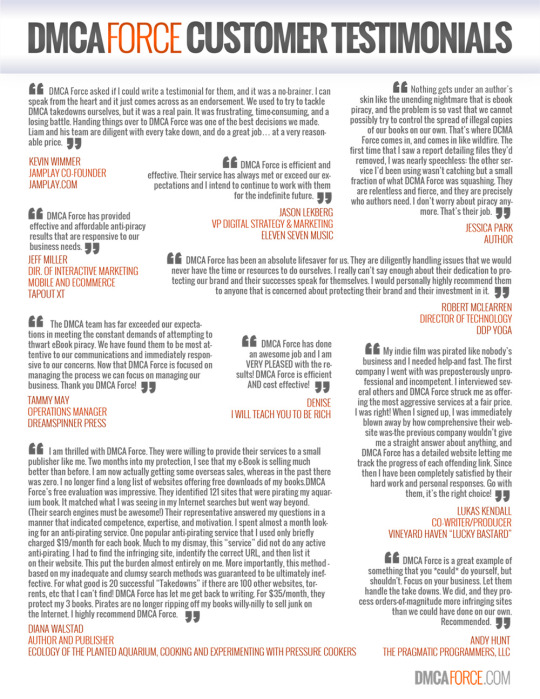
See what everyone is saying about DMCA Force!
#Eleven Seven Music#JamPlay.com#The Pragmatic Programmers#I Will Teach You To Be Rich#Diana Walstad#DDP Yoga#Lucky Bastard#Tapout XT#Dreamspinner Press#Jessica Park
0 notes
Link
Readers have loved romance novels for hundreds of years. The deep emotional connection developed by talented romance writers has created loyal fans, who eagerly anticipate the next release from their favorite author.
While the digital age and the growing use of e-readers have negatively impacted much of the publishing industry, the Romance Genre has enjoyed healthy growth, which many attribute to e-readers allowing for more discreet reading by fans. Despite the positive trend, it’s important for Romance Authors to balance providing digital distribution with the implementation of anti-piracy strategies.
0 notes
Link
Recently we had the opportunity to talk with Uncommon Journalism about online piracy and ad revenue. Check out the full length article now!
0 notes
Link
In a recent report from the Digital Citizens Alliance, the nonprofit organization who focuses on Internet safety has released just how much ad revenue was generated from pirate sites in 2013. Ready for the staggering number? $227 million dollars was spent in online advertising on pirate sites from countless companies such as AT&T, Lego and Toyota.
0 notes
Text
New Music Inc. App Discourages Piracy
The Intellectual Property Office, UK Music and the animation company Aardman have collaborated to release an iOS and Android game titled, Music Inc.
Music Inc. was created with the purpose of allowing users to emerge oneself in the music production world by setting up a record label, signing artists scheduling shows and more.
However, creating a virtual record label is not the only lesson of the game and throughout it, users are presented with scenarios of how to battle online piracy.
During the game, pop-up notifications appear about pirate sites and options such as, ‘A popular blog has ripped your artist’s song and posited it, do you let them keep it up?’ Depending on the user’s choice, the fictional record label will experience what many modern day labels endure.
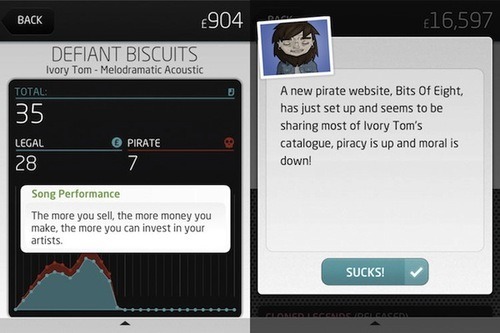
Jo Dipple, UK Music CEO commented, “Our goal is to give young music lovers a taste of what it’s like to work in the music industry and convey a message about the value of creativity in a fun and interactive way. Players of Music Inc will see how vital every stage in the music-making process is.”
With the release of Music Inc., many hope this helps consumers across the world understand how the industry works but also gives a better understanding of how creators earn money from their releases, especially as an emerging artist in the digital age.
0 notes
Text
Prince Files Lawsuit Against Music Bootleggers
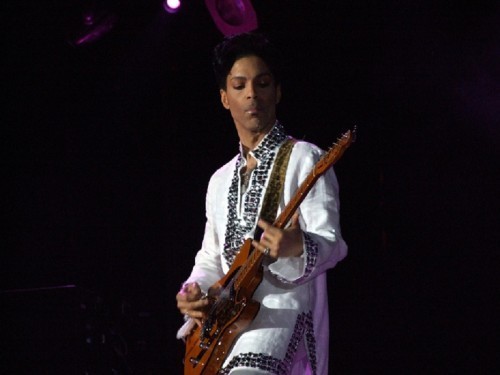
Pop legend Prince has filed a lawsuit against Facebook and Blogger users who are believed to have distributed several of his live performances without permission.
A copyright lawsuit was filed on January 16th in the Northern District of California against 22 individuals who are believed to have leaked and shared several live performances. Prince is seeking $1 million dollars in damages from each user along with a permanent injunction to prevent the individuals from doing further harm.
As of now only two defendants have been named in the suit while the remaining John Does are being recognized by their online handles.
“Defendants rely on either Google’s Blogger platform or Facebook, or both, to accomplish their unlawful activity,” court papers read. “Rather than publishing lawful content to their blogs, they typically publish posts that list all of the songs performed at a certain Prince live show and then provide a link to a file sharing service where unauthorized copies of the performance can be downloaded.”
Prince’s lawyers have uncovered more than 363 illicit links on just one of the websites and believe the discovery will “continue to cause substantial, immediate and irreparable injury.”
For those who have viewed DMCA Force‘s Piracy Statistics page, you probably have noticed the amount of pirate URLS we encounter that are blog based. It isn’t a surprise for us to learn about online users distributing copyrighted content through these blogging platforms, given the easiness and quick ability to share.
If you’re concerned or worried about where your original content is being distributed online, please do not hesitate to contact us for an in depth complimentary evaluation.
0 notes
Text
Major Publishers Sue Hotfile For Copyright Infringement
Several major book publishers have filed a complaint with a Florida District Court, and are pursuing up to $7.5 million in damages from the now defunct file-sharing website, Hotfile.
Pearson Education, Cengage Learning, John Wiley and Sons, Elsevier and McGraw-Hill filed the complaint, accusing Hotfile of copyright infringement.
A spokesman for the publishers stated, “Hotfile built a business off of infringement. The book publishers’ rights were massively infringed by the site and its operators. They should not be allowed to simply pocket their profits and walk away from the harm they caused.”
50 books have been submitted as evidence and if found guilty, Hotfile could face up to $7.5 million in damages.
Just last month the file-sharing site ended its legal battle with the MPAA in a $80 million settlement which leaves many questioning if Hotfile has the funds to settle this complaint.
“Hotfile failed to ban with any consistency repeat infringers who accounted for a large percentage of the infringing files on the system. Despite receiving millions of DMCA notices, Hotfile did not track whether any of the uploads came from the same user,” the publishers note.
Due to Hotfile’s negligent policies, a group of persistent infringers were able to upload millions of files. The total amount of files equaled 44 percent of the files on Hotfile, according to the publishers.
#Hotfile#Pearson Education#Cengage Learning#John Wiley and Sons#Elsevier#McGraw-Hill#Publishing#Textbooks#DMCA#DMCA Force#Takedown Notice
0 notes
Quote
So let me repeat, once more: literature not only breaks the rules, but makes us realize that there are none.
Highlighted by readlearnwrite in Reading Like a Writer by Francine Prose (via readmill)
21 notes
·
View notes
Text
RIAA Presents Google With A Five Point Plan
Yesterday the global music industry sent its 100 millionth music piracy notice to Google. This number can account for a variety of things such as 100 million times users had the ability to download illegal content or 100 million times artists and labels missed out on the opportunity to gain revenue from the music they themselves had created.
Using its 100 millionth takedown request as a platform to speak about Google and the role it plays in online piracy, the RIAA has announced a 5 point plan of what it thinks Google can do to better help combat piracy. Cary Sherman, CEO of the RIAA has given praise to some of the smaller steps Google has taken such as creating Google Play but notes, “We’ve seen no demonstrable demotion of sites that receive a high volume of piracy notices.”
Sherman goes onto explain how the 5 steps would be simple and straightforward for Google to perform.
• Fulfill the admirable promise to demote sites receiving extensive numbers of piracy notices
• Make sure that the “take down” of a song is meaningful – not repopulated online two seconds later
• Educate users by identifying authorized sites with a consumer-friendly “icon”
• Stop leading users to illegal sites through autocomplete
• Give your repeat offender policies some teeth
DMCA Force has previously reported the large volume of takedown requests Google receives daily but also the outline for which Google fights online piracy. However, is it possible for the RIAA to convince Google to step up to the plate and follow the 5 point plan? The RIAA thinks it is possible and believes both companies can work side by side to create an Internet ecosystem that will better asset both consumers and copyright holders in legal commerce.
Sherman concluded by saying, “None of these steps would interfere with the user experience that fans of Google have come to expect. It would signal a new day and unprecedented collaboration between one of the world’s leading technology companies and the global music business. It’s a win for everyone. What are we waiting for?”
0 notes
Photo

How Netflix won CES
It’s not the TVs, it’s what you watch on them
54 notes
·
View notes
Link
Another year, another several dozen captivating books to add to your ever-growing reading list. You may still be conquering the mountain of titles you were gifted during the holidays, or the pile of award-winners you picked up at the end of last year, so anticipating 2014's heavy hitters may seem overwhelming.
0 notes
Text
According to a new analysis, Bruno Mars and Rihanna were the world’s most pirated musicians of 2013.
The popular music tool Musicmetric, analyzed data from BitTorrent and discovered both artists were downloaded more than 5 million times over the course of 2013. Other artists who followed closely behind were Daft Punk, Justin Timberlake, Flo Rida and Kanye West. A total of 64.5 million illegal downloads occurred for the top 20 artists of 2013.
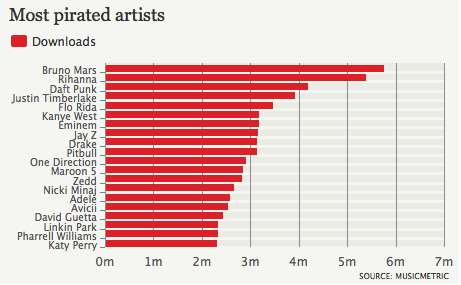
Musicmetric also recently revealed Beyonce’s newest album had soared on the file sharing charts and was downloaded 240,000 times within the first week of its release. Had these numbers been converted into physical sales at an estimate of $15.99 each, the album would have grossed another $3.8 million dollars.
Regardless of audience size, music is still an easily accessible item for countless people to download illegally. If you are an artist, copyright holder and/or label manager, please do not hesitate to contact us and see what options we have available to help put an end to online piracy and your content. DMCA Force also offers a complimentary evaluation to show you how piracy is affecting your product.
#Top 20#Pirated Music#Online Piracy#Musicmetric#BitTorrent#Bruno Mars#Rihanna#DMCA Force#Beyonce#Daft Punk
0 notes
Text
AT&T Creates New Technology To Detect and Ban Filesharing
Telecom giant AT&T can add one more specialty to its already expanding portfolio, anti-piracy technology. AT&T has been awarded a new patent that will allow the Internet Service Provider to scan its networks for any filesharing users.
The new technology will be able to monitor user behavior and if any unauthorized content appears, the user will be placed in a so called, “risk class” which allows for the ISP to take appropriate action to decrease illegal behavior.
“Although the Internet may provide many useful resources for users, widespread access also provides an avenue for unscrupulous users and/or activities,” states the patent application.
“In this regard, many Internet users do not possess the knowledge and/or sophistication to avoid risks associated with accessing the Internet. Accordingly, many users may fall victim to exploits and/or malicious schemes of undesirable elements on the Internet, such as, for example, hackers. Internet piracy may account for significant bandwidth usage, which may be problematic for a service provider. Thus far, copyright protection measures that have been deployed by, for example, the entertainment industry, have failed to curtail increases in Internet piracy.”
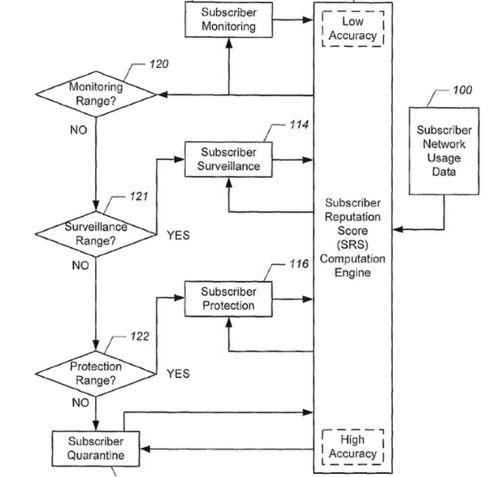
At this point it is unknown when the ISP will implement the new technology or whether it will lease it to other firms. Despite ongoing efforts from industry groups such as the RIAA and MPAA, piracy is still a problem that plagues many copyright holders. In a study released earlier this year by NetNames, almost one-fourth of the total bandwidth used by all Internet users was used to gain access to protected intellectual property. For individuals who are concerned about their original content being pirated, please contact DMCA Force for a complimentary evaluation.
0 notes
